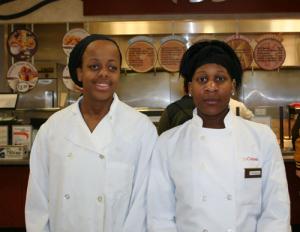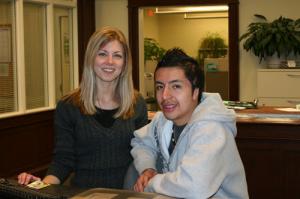New Program Places Katzenbach Students in On-Campus Internships
A new partnership between The College of New Jersey and New Jersey School for the Deaf (NJSD) is paying benefits to the students from both schools who are involved.


A new partnership between TCNJ and New Jersey School for the Deaf (NJSD) is paying benefits to the students from both schools who are involved.
Carlos “Dani” Quiroz, Ashley Christopher, and Tushanda McKinney, all seniors at NJSD’s Katzenbach campus, are taking part in their school’s Structured Learning Experience (SLE). The program places qualified students in internships with area business partners, said Lisa Gerstacker, the program coordinator for Katzenbach.
This is the SLE program’s first year, Gerstacker said, and TCNJ was a natural choice as a partner site because the College offers a deaf education program. Two TCNJ deaf education majors, Andrea Weatherly ’10 and Julia Carey ’09, are serving as mentors to the Katzenbach students, meeting with them regularly and supporting them while they’re here on campus.
“Part of our role is to be there if and when they need someone to talk to while they’re on campus—for instance, if they have questions about the college or getting around campus,” said Carey.
“Sometimes I’ll help them with their homework if they have a question, or we might just talk about how their weekend went,” added Weatherly.
TCNJ Professor Barbara Strassman, coordinator of the College’s Program in Education of the Deaf and Hard of Hearing, helped Gerstacker secure the internships on campus. Strassman explained that the state of New Jersey mandates “transition planning” as part of each student’s secondary-educational experience. “This SLE program is a unique way that the mandate is being implemented, and it will help these young people have productive lives after high school,” said Strassman.
The program has been a great help to all students involved. “It’s great for the Katzenbach students to be able to talk with people who are closer to their age than their teachers or principal,” Gerstacker said. More important, she added, is the real-life experience the students are gaining.

“Because Dani plans to go to college, I thought working in TCNJ’s library would be a good experience for him. The internship allows him to interact with other college students and see how a college library works,” said Gerstacker.
Quiroz’s responsibilities include manning the library’s circulation desk, re-shelving books, and organizing the stacks. “Whatever they throw at me to do, I do it,” he said, adding that he has enjoyed the internship tremendously. “I feel like a college student when I’m here. The students on campus are very nice, and everyone is so mature,” he said.
Christopher and McKinney are students in Katzenbach’s food-services program. Gerstacker secured them internships in TCNJ’s Student Center Food Court.
“They will likely seek employment in the food-services industry after graduating, and the experience of working in that industry outside of the deaf community has been invaluable for them,” Gerstacker explained. “It helps them build their resume, and it’s a great way for them to learn independence—another important skill in the real world.”
Carey, whose student-teaching experiences have been with younger deaf students, said she has enjoyed the opportunity to mentor Dani, who is closer to her own age.
Weatherly concurred, saying, “Having this opportunity to interact with students who are in high school is a great opportunity. It’s great to work with the younger students, as I have done with my student teaching, but I won’t improve my signing and communication skills unless I practice with a fluent signer. Working with Tushanda and Ashley gives me that opportunity.”
Posted on April 10, 2009

